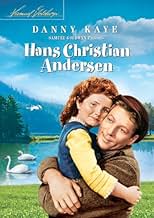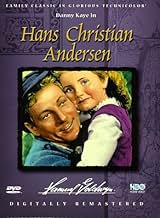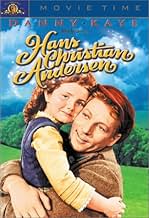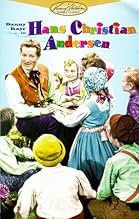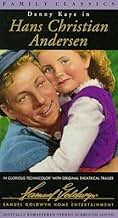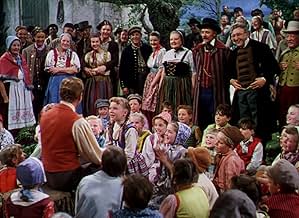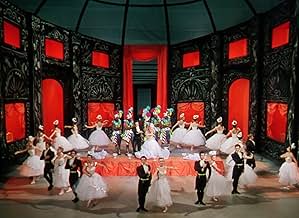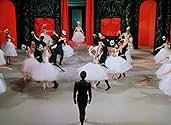VALUTAZIONE IMDb
6,9/10
4494
LA TUA VALUTAZIONE
Aggiungi una trama nella tua linguaThe opening scene of the movie describes it best: "Once upon a time there lived in Denmark a great storyteller named Hans Christian Andersen. This is not the story of his life, but a fairy t... Leggi tuttoThe opening scene of the movie describes it best: "Once upon a time there lived in Denmark a great storyteller named Hans Christian Andersen. This is not the story of his life, but a fairy tale about the great spinner of fairy tales."The opening scene of the movie describes it best: "Once upon a time there lived in Denmark a great storyteller named Hans Christian Andersen. This is not the story of his life, but a fairy tale about the great spinner of fairy tales."
- Regia
- Sceneggiatura
- Star
- Candidato a 6 Oscar
- 10 candidature totali
Zizi Jeanmaire
- Doro
- (as Jeanmaire The Famous French Ballerina)
Joseph Walsh
- Peter
- (as Joey Walsh)
Peter J. Votrian
- Lars
- (as Peter Votrian)
Lee Aaker
- Little Boy
- (non citato nei titoli originali)
Patsy Bangs
- Dancer
- (non citato nei titoli originali)
Arthur Berkeley
- Townsman
- (non citato nei titoli originali)
Recensioni in evidenza
A fictional account of the life of storyteller Hans Christian Andersen. First, if you haven't read his stories, then you probably won't appreciate this movie as much as you should. It's a perfect excuse to read them with your family, then watch the movie. Second, if you're expecting a sophisticated, adult-oriented story, you will be disappointed; however, the morals to Hans' stories, as well as the movie's lessons, are very worthy. That said, the musical numbers are an absolute delight -- Danny Kaye never fails to deliver a wonderful performance, and where else can you learn to sing stories, instead of tell them, for your children? -- and the ballets are great for this venue. We even get to see the movie's choreographer dance in one of the numbers. This movie was nominated for several Oscars. It deserved those nominations. Don't skip this one, especially if you have small children.
10llltdesq
Whoever reviewed this film for Maltin's Guide (I wish they'd indicate who the reviewer is by initials or something. It'd make the book more useful) does not share my tastes. I personally don't care that it bears no relation to Andersen's life. They admit it up front. Judge a film by itself, not on it's supposed relation to reality! Given Andersen's real life and his moody, pessemistic nature, I doubt being more accurate would have been a good thing. The score is beautiful, the sets and Costumes are great and Danny Kaye was wonderful! I haven't seen the movie for a couple of years and I stll remember most of the score! Granted, it's not one of the all-time greats, but it's better than the Maltin review implies. A worthy effort. Recommended.
Every single biopic of a creative artist tells the same story, whether it's true or not: the Philistine World, or some part thereof, rejects the artist, and fails to see his greatness; but later on, perhaps during his lifetime, perhaps not, it sees the error of its ways. That happens here. Hans Christian Andersen is a village cobbler whose compulsive inventiveness is little thought of until he makes good in Copenhagen, after which...
But there's much more going on.
There's no doubt that Andersen was a great artist, in some sense. `The Ugly Duckling' and `The Emperor's New Clothes' are two of the greatest short stories - fables, folktales - all of these - ever composed. But he had his limitations. There were many kinds of stories he just couldn't write. His fertile talent for anthropomorphising was often a millstone. In many respects he seems to have been a childish and naive man. But get this: all of these limitations make it onto the screen. Both the story and Danny Kaye's performance (a great performance) make Andersen into a human being who is NOT the greatest storyteller since Shakespeare, but who can be admired for what he is.
The main story isn't the `unrecognised genius' bit: it's a story of unrequited love. While in Copenhagen Andersen spends most of his time banging his head against the wall over an unattainable ballerina, whose interest in him is, as they say, purely professional. He manages to be quite cruel to a close friend in the process, right up to the point where it's unclear that a reconciliation is possible. (Indeed, it's unclear whether or not one occurs.) When he realises what a fool he's been he just trudges back, defeated, to his village. And it's here we have the obligatory scene where the villagers realise how great he was after all, mainly by singing the highly memorable refrains of the movie's songs, one after the other. Well, the film needed some ending. I'm inclined to forgive this one.
There's also a lengthy Little Mermaid ballet - seven minutes long? more? - danced in its entirety. (We see a LOT of the ballerina's craft in Copenhagen.) This sort of thing wasn't too unusual in the 1950s but it's a genuine gamble in context - and one that I think pays off. By the time the ballet appears the cheery story of an eccentric village storyteller had become surprisingly dark. Vidor, it seems, would rather risk having people leave the cinema than insult those who remain. Good for him. I can't claim that this film works in every respect, and perhaps you won't like it, but I'm sure you won't feel cheated by it.
But there's much more going on.
There's no doubt that Andersen was a great artist, in some sense. `The Ugly Duckling' and `The Emperor's New Clothes' are two of the greatest short stories - fables, folktales - all of these - ever composed. But he had his limitations. There were many kinds of stories he just couldn't write. His fertile talent for anthropomorphising was often a millstone. In many respects he seems to have been a childish and naive man. But get this: all of these limitations make it onto the screen. Both the story and Danny Kaye's performance (a great performance) make Andersen into a human being who is NOT the greatest storyteller since Shakespeare, but who can be admired for what he is.
The main story isn't the `unrecognised genius' bit: it's a story of unrequited love. While in Copenhagen Andersen spends most of his time banging his head against the wall over an unattainable ballerina, whose interest in him is, as they say, purely professional. He manages to be quite cruel to a close friend in the process, right up to the point where it's unclear that a reconciliation is possible. (Indeed, it's unclear whether or not one occurs.) When he realises what a fool he's been he just trudges back, defeated, to his village. And it's here we have the obligatory scene where the villagers realise how great he was after all, mainly by singing the highly memorable refrains of the movie's songs, one after the other. Well, the film needed some ending. I'm inclined to forgive this one.
There's also a lengthy Little Mermaid ballet - seven minutes long? more? - danced in its entirety. (We see a LOT of the ballerina's craft in Copenhagen.) This sort of thing wasn't too unusual in the 1950s but it's a genuine gamble in context - and one that I think pays off. By the time the ballet appears the cheery story of an eccentric village storyteller had become surprisingly dark. Vidor, it seems, would rather risk having people leave the cinema than insult those who remain. Good for him. I can't claim that this film works in every respect, and perhaps you won't like it, but I'm sure you won't feel cheated by it.
A lot of the comments previously made here are true and this certainly isn't any kind of real biographical film of Hans Christian Anderson. But one must remember that Samuel Goldwyn was primarily making this film as children's entertainment. And on that level he succeeded brilliantly.
In fact at the age of 5 in the cinema in Brooklyn this was the first movie on the big screen I ever remember seeing. My father was a big Danny Kaye fan so the whole family went to see it. And of course one of the first long-playing records we had in our house was the soundtrack to that film.
Another reviewer said that Frank Loesser's score was the highlight for him in the film. I don't think Danny Kaye ever had better material to sing with on the screen. Up to this point he got by with stuff especially written for him by his wife Sylvia Fine. He proved here in Hans Christian Anderson that he could definitely succeed without it.
Anyway when I view this film I'm five years old again. You will be too if you see it.
In fact at the age of 5 in the cinema in Brooklyn this was the first movie on the big screen I ever remember seeing. My father was a big Danny Kaye fan so the whole family went to see it. And of course one of the first long-playing records we had in our house was the soundtrack to that film.
Another reviewer said that Frank Loesser's score was the highlight for him in the film. I don't think Danny Kaye ever had better material to sing with on the screen. Up to this point he got by with stuff especially written for him by his wife Sylvia Fine. He proved here in Hans Christian Anderson that he could definitely succeed without it.
Anyway when I view this film I'm five years old again. You will be too if you see it.
This film is fantastic. The problem is hardly anybody has seen it, and anybody who hasn't is seriously missing out. It features Danny Kaye in his element here, as the fairy-tale author, and a superb score by Frank Loesser. All the songs are moving or humorous, and I recognised all of the fairy tales. I was moved by Ugly Duckling, laughing with delight at Thumbelina, and swaying in time to the music of Copenhagen, which has never looked that beautiful. The supporting stars are solid, most notably from Joey Walsh, Farley Granger and Jeanmaire. Speaking of the ballet sequences, I disagree that they were plodding. It may have been 20 minutes long, but the little mermaid, for me was the highlight of the film, and perfectly set to the music of Lizst. Hearing Schubert's Rosamunde was a delight, and when I heard the music to Anderson's dream(him trying to get Doro away from Nils), I genuinely felt I was watching a Wagnerian opera, with its devilish imagery and Flying Dutchman -like incidental music. Danny Kaye was fantastic in the song numbers, and although his voice isn't large, he has phenomenal breath control that is almost as good as that of the opera singer Tito Schipa. Watch this musical, which is perfectly-paced. If you don't see this, you're seriously missing out! 10/10. Bethany Cox
Lo sapevi?
- QuizIn order to cover the necessary camera tricks, and to add "magic" to the Little Mermaid ballet, it was decided that, rather than presenting it as an actual ballet, they would have Hans imagine how it would look. This allowed them to do things on the screen which would be impossible on the stage.
- BlooperDuring the "Wonderful, Wonderful Copenhagen" song the concertina player directly behind the singer never moves his fingers on the keys.
- Curiosità sui creditiOpening credits: "Once upon a time there lived in Denmark a great storyteller named Hans Christian Andersen. This is not the story of his life, but a fairy tale about this great spinner of fairy tales."
- ConnessioniFeatured in Siskel & Ebert & the Movies: The Movies We Loved as Kids (1991)
- Colonne sonoreThe King's New Clothes
(uncredited)
Music and Lyrics by Frank Loesser
Sung by Danny Kaye and children
Reprised by Kaye, children, and Chorus in the Finale
I più visti
Accedi per valutare e creare un elenco di titoli salvati per ottenere consigli personalizzati
- How long is Hans Christian Andersen?Powered by Alexa
Dettagli
- Data di uscita
- Paese di origine
- Sito ufficiale
- Lingua
- Celebre anche come
- Hans Christian Andersen
- Luoghi delle riprese
- Azienda produttrice
- Vedi altri crediti dell’azienda su IMDbPro
Botteghino
- Budget
- 4.000.000 USD (previsto)
- Tempo di esecuzione
- 1h 52min(112 min)
- Proporzioni
- 1.33 : 1
Contribuisci a questa pagina
Suggerisci una modifica o aggiungi i contenuti mancanti


